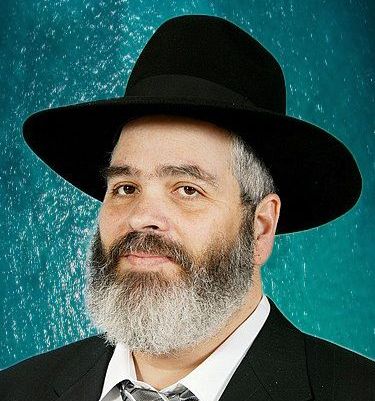  |
|
| |||||

This Google Custom Search looks only in this website. How do We Fight Yishmoel?
In a letter to the yeshiva students in Bnei Brak, HaRav Yitzchok Hacker wrote his unique take on this period.
Yishmoel is wont to say regarding anything they wish to do: 'Allah is with us,' which is why our exile under this rule is more difficult than the other exiles. Yishmoel breached all barriers.
And what is their justification for such action? 'Allah sent us.' They are adapting their credo to their wills.
HaRav Chaim Vital noted that Yishmoel, "A wild one," unbridled, is their very philosophy, part of their religion, as being the emissary of G-d. But precisely the fact that they enslave their beliefs to their desires will cause them to fail.
Here is a glimpse as how Chazal view this condition in the Pirkei deRabi Elazar (28) and in Zohar (II, p 32) at length...
The world wants to send humanitarian aid to Gaza, to the myriad refugees who were forced to leave their homes because of the IDF bombardment. How much pity and mercy there exists in the world!
The selfsame compassion which led to the flow of billions of dollars to Gaza but which oiled Hamas' war machinery and enabled this murderous organization to deflect the money sent for the needy and to purchase weaponry instead. It enabled them to create a well-trained army, dig tunnels throughout the Strip, brutally eliminate all dissenters and to attack Israel — which led to the need to rebuild their ruins and starve the people who should have received that aid.
Again, Israeli publicity is faltering. Perhaps it isn't so pleasant for Israel to admit it, but even here, in a progressive country, there are tens of thousands of refugees...
"The daughter of so-and-so to so-and-so" — what does this mean? Hashem designs marriage matches, but the rule is that finding one's predestined match is as difficult as the splitting of the sea! This series of fundamental issues and understanding of shidduchim was first published in 1992, about 31 years ago!
Part II
How did R' Chaim of Volozhin arrange his daughter's match? More about suggested matches, hishtadlus and the matchmaker's fee.
* * *
Outstanding Articles From Our Archives
IN-DEPTH FEATURES
by Rabbi Dov Eliach
Part 2
Handling the American Great Depression
YN: What kind of problems were brought to him?
Rav Shechter: I'll give you an example that actually happened. When we students from abroad came to yeshiva, aged seventeen or eighteen, after learning in American yeshivos, our level was such that only with difficulty could we get through a piece of gemora together with Rashi and easy Tosafos, no more than that. By contrast, the level of the scholarship in the yeshiva was at a peak. We Americans therefore had to hire tutors from among the older bochurim to be our first chavrusas of the day
I learned with Reb Yonah Minsker [zt'l, Hy'd, who was mentioned earlier], for two or three years - I can't remember how long. For the second seder I also took a chavrusa in exchange for payment. My father zt'l would send me fifty American dollars a month, out of which I paid Reb Yonah fifteen dollars and the other chavrusa ten dollars. The remaining twenty-five dollars was enough for me to live in Mir like a king. Over there it was considered a vast sum.
In my third or fourth year in the yeshiva there was a severe economic depression in America. They wrote to me from home saying that they had to cut down on expenses and that instead of fifty dollars I would be receiving only twenty-five. We foreign students didn't know what to do. On the one hand we needed to live. But on the other hand, how could we forgo our tutors, after having gotten used to a few years' of learning with such great people?
[We wrestled with the problem] until one of our group proposed an idea. Until then, each of us had been paying separately for his own tutor. From now on, we would take one tutor for five talmidim, each of whom would contribute five dollars. Our friends agreed to the idea - wonderful! It was decided that I would be the [group's] emissary to the Rosh Yeshiva, to put our plan to him.
I went in to the Rosh Yeshiva, Reb Leizer Yudel and of course he already knew all about the depression in America. But when he heard what I wanted to do, he immediately said, "It can't be! What you're thinking of is impossible! Absolutely no way!" - without explaining himself in the slightest.
I went back to my friends and told them, "Chevra, it's not going to work. The Rosh Yeshiva said, `No way!' "
"So go to the Mashgiach," they said to me but they told me what to say to him. "Tell the Mashgiach the whole story," they advised, "and tell him that you went to the Rosh Yeshiva and that he said, `No way' and that we're therefore considering transferring to another yeshiva. He's bound to ask you which yeshiva, so tell him to Telz . .
IN-DEPTH FEATURE
by Rabbi Shlomo Lorincz
Chapter Fifteen: The Tzaddik Lives by His Faith
Ein Od Milvado
Maran the Chazon Ish ztvk'l said in the name of Maran HaRav Chaim Ozer ztvk'l: "The Brisker Rov's yiras Shomayim belonged to the era of five hundred years ago." But not only in this aspect was he so outstanding; his measure of emunah and bitochon were truly shining examples for his generation.
One finds that when a person is traveling, or when his life is being threatened, he loses his equilibrium; he is not himself. Certainly, at such times he is unable to focus his thoughts upon Hashem. But with Maran, even during times of grave danger, not an iota was lacking of his steady single- minded adherence to Hashem.
In 5700, after the outbreak of World War II, Maran was staying in Warsaw when someone from his household entered his room, waving a newspaper. "What's new?" asked Maran.
The latter replied that nothing had changed. Maran took the newspaper into his hand and his eyes immediately fell upon an item stating that the Russians had given up their claim to Vilna and had relinquished it to Lithuanian sovereignty.
"How can you say that nothing is new when the return of Vilna to Lithuania is a major event!" he exclaimed.
And thereupon, Maran decided to pick himself up and escape to Vilna so as to avoid Russian rule. He urged his family to prepare themselves to go as quickly as possible. Such a trip was fraught with danger and difficulty, since the Germans ruled most of Poland and it would take three days to get from Warsaw to Vilna by horse and carriage. But the decision was cast.
|
|||||




.jpg)


